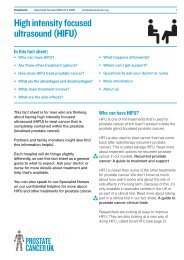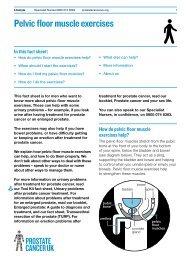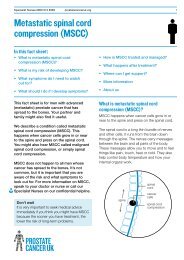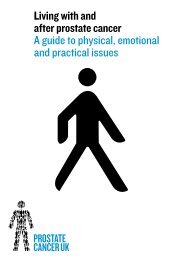Cryotherapy - Prostate Cancer Charity
Cryotherapy - Prostate Cancer Charity
Cryotherapy - Prostate Cancer Charity
You also want an ePaper? Increase the reach of your titles
YUMPU automatically turns print PDFs into web optimized ePapers that Google loves.
Treatment Specialist Nurses 0800 074 8383 prostatecanceruk.org<br />
3<br />
• <strong>Cryotherapy</strong> may be a treatment option<br />
if your cancer has come back after<br />
radiotherapy or brachytherapy.<br />
Disadvantages<br />
• Many men who have cryotherapy have long<br />
term erectile problems following treatment.<br />
• There is also a risk of other side effects which<br />
could affect your quality of life such as urinary<br />
problems and a small risk of bowel problems.<br />
• We do not know as much about how effective<br />
the treatment is in the long term (after 10 or<br />
15 years), compared with other treatments.<br />
• <strong>Cryotherapy</strong> is only available in specialist<br />
centres in the UK or as part of a clinical trial.<br />
What might be an advantage for one person<br />
may not be for someone else. Please talk to<br />
your doctor or nurse about your own situation.<br />
What does cryotherapy involve<br />
Each hospital will do things slightly differently,<br />
so ask your doctor or nurse for details of how<br />
they carry out the procedure.<br />
Before having treatment<br />
Your doctor or nurse may ask you to take some<br />
medicine, called a laxative, to help empty your<br />
bowels immediately before treatment. This will<br />
give your doctor a good view of the prostate<br />
gland during treatment using an ultrasound<br />
probe (see below).<br />
During treatment<br />
<strong>Cryotherapy</strong> is usually done under general<br />
anaesthetic so that you are asleep during the<br />
treatment. It is sometimes done under local<br />
anaesthetic so that you are awake but won’t<br />
feel anything.<br />
A tube, known as a warming catheter, is passed<br />
through your penis into your bladder. Warm<br />
liquid is circulated through the catheter during<br />
the treatment. This is to help prevent the tube<br />
which you pass urine through (your urethra) from<br />
freezing and being damaged during treatment.<br />
An ultrasound probe is inserted into your back<br />
passage. This allows your doctor to see an<br />
image of the prostate gland and make sure the<br />
cryotherapy needles are in the right place. Several<br />
thin needles, known as cryoneedles or cryoprobes,<br />
are then inserted into the prostate gland through<br />
the skin between the testicles and back passage<br />
(perineum). Probes to monitor temperature are also<br />
inserted into and around the prostate gland.<br />
Freezing gasses are passed down the needles,<br />
causing the temperature to drop to about –40 o C.<br />
This freezes and destroys the surrounding tissue.<br />
The prostate gland is then allowed to warm up,<br />
either naturally, or by passing a different gas<br />
through the needles to warm the gland more<br />
quickly. This is called a freeze-thaw cycle. The<br />
process of freezing and thawing is repeated.<br />
There are usually two freeze-thaw cycles but there<br />
may be more if you have a large prostate gland.<br />
The needles and probes are then removed and,<br />
after about 20 minutes, the warming catheter is<br />
also removed. Another tube, used to drain urine,<br />
will be passed into your bladder either through the<br />
penis (urethral catheter) or through a small cut in<br />
your abdomen (suprapubic catheter). This will be<br />
left in for one to two weeks after you go home. The<br />
whole process usually takes around two hours.<br />
Going home after treatment<br />
Most people can go home on the same day<br />
or the following day. It is normal to have some<br />
discomfort, and your doctor or nurse will tell you<br />
which pain-relieving drugs you can take. You will<br />
be given antibiotics to reduce the risk of infection<br />
which you will need to take for a few days after<br />
you go home. If your urine starts to smell strongly<br />
or if you have a temperature, contact your doctor<br />
or nurse. These could be signs of an infection and<br />
you may need more antibiotics.<br />
You will go home with a catheter in place to<br />
avoid any problems passing urine. This will be<br />
left in for one to two weeks. Your nurse will show<br />
you how to care for the catheter before you<br />
leave the hospital. Some treatment centres may<br />
also give you medication called alpha-blockers<br />
to relax the muscle in and around the prostate<br />
to help you pass urine.










